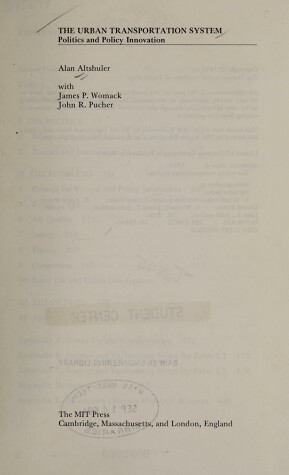Despite commuter complaints and some genuine hardship for those without ready access to automobiles, the American system of urban transportation is a resounding success from the standpoint of the vast majority of urban residents. Nor are any developments on the horizon, such as oil shortages, likely to threaten the pattern of auto-dominance. There has been rapidly growing concern in recent years, however, about specific problems associated with the system--most notably, its high energy requirements, its air pollution effects, its high fatality rates, and its equity consequences. There is also wide disillusion with the main traditional instruments of urban transportation policy, expensive highway and mass transit investments. Thus public officials find themselves under intense pressure to ameliorate the "problems" of urban transportation, but simultaneously constrained to do so in ways that are unobtrusive from the standpoint of the average traveler, that avoid community disruption, and that entail minimal new budgetary requirements.These are a few of the conclusions reached by Alan Altshuler in "The Urban Transportation System, " a comprehensive and original examination of the factors that have shaped the U.S. urban transportation system and of innovative options available to today's policy makers. Because it offers both a systematic, multidisciplinary analysis of the problems and available alternatives in urban transportation, and a political analysis of the ways in which policy makers actually choose among options, the book will interest students of American politics, policy and analysis, and the interplay of technology and policy, as well as researchers and policy makers whose concerns center on the urban transportation system itself."Part I" reviews the postwar history of urban transportation policy and advances a set of propositions about how to rank potential innovations with reference to political feasibility."Part II" examines the criteria by which both critics and defenders of the urban transportation system seem to evaluate it. It then devotes separate chapters to the six main "problems" on which critics of the system focus: energy, air pollution, safety, equity, congestion, and urban sprawl. Each of these chapters examines the nature of the problem and of public controversy about it, and appraises the likely cost-effectiveness of the most plausible strategies for dealing with it."Part III" focuses on eight broad policy categories, asking which appear to combine in high degree both political feasibility and cost-effectiveness "re" the main problems of urban transportation. The options examined include highway capacity expansion, fixed route transit service expansion, demand responsive transit, private ride-sharing, traffic management techniques giving preference to high occupancy vehicles, performance standard regulation of the auto manufacturers, direct consumer regulation, and price disincentives intended to curtail auto travel and/or gasoline consumption.Reporting in the "Wall Street Journal" on this new study, Alan L. Otten describes it as a "fact-jammed, tightly argued" analysis whose conclusions "fly in the face of conventional wisdom." Similarly Edwin Diamond, writing in "Esquire, " has noted that "Altshuler upsets most conventional wisdom. His practical experience enables him to look at the road ahead without undue romanticism about a landscape long-since passed."The Urban Transportation System" is included in the MIT-Harvard Joint Center for Urban Studies Series and in the MIT Press Transportation Studies Series.
- ISBN10 0262010550
- ISBN13 9780262010559
- Publish Date May 1979
- Publish Status Out of Print
- Out of Print 18 September 2010
- Publish Country US
- Publisher MIT Press Ltd
- Imprint MIT Press
- Format Hardcover
- Pages 512
- Language English
